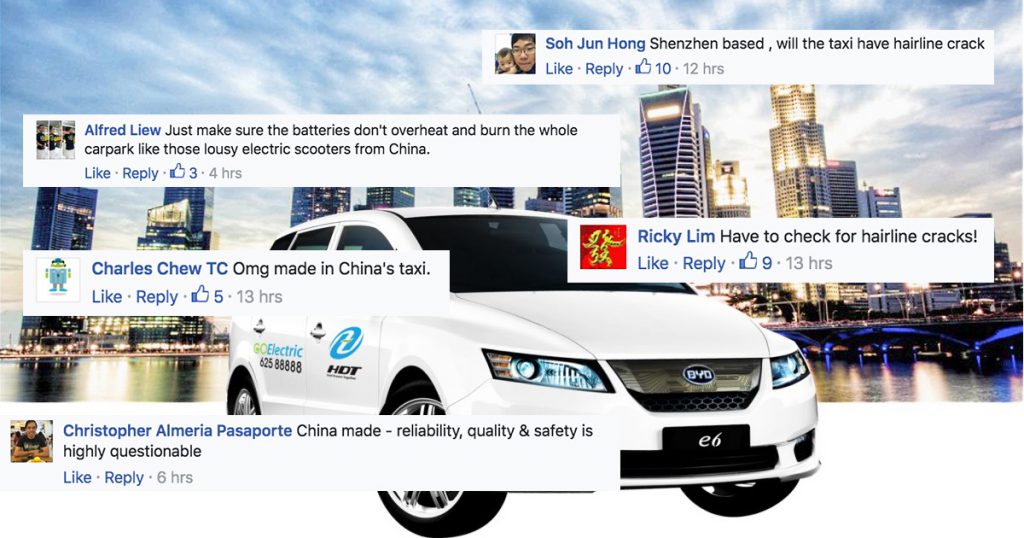The last time we heard from HDT Singapore Taxi was about a month ago, when LTA confirmed that it was the sole applicant for phase 2 of their electrical car test-bed.
Well, it’s now official, and Singaporeans will be able to hitch a ride on an electric taxi come the first week of September.
HDT announced yesterday that it plans to push its fleet out after getting approval from the Land Transport Authority (LTA), joining the current 28,000 fleet of taxis zipping around Singapore.
According to HDT, the service will run for 8 years, and is in line with LTA and the Singapore Economic Development Board (EDB)’s plans to study the viability and potential that electric vehicle business models in Singapore.
The e-taxi trial will be starting with over 10 vehicles, and the company plans to release 100 of them by the first quarter of 2017.
The numbers are relatively minuscule as compared to other taxi companies (for example, Comfort Delgro has over 17,000), but it is definitely a huge step for electric vehicles becoming more mainstream in Singapore.
For a chance to ride on an electric taxi, HDT mentions on its website that it’s in collaboration with GrabTaxi, and interested parties can use the app to book one of them “at any time, from any location”.

As a matter of fact, a private fleet of 30 of these e-cabs are actually currently available, and users of the Grab app might get a chance to ride on one of them – if they’re lucky.
90 Minute Charge For 350km, Prices Tagged To Market Rate
Following HDT’s vision to “create a clean, pollution-free future powered by electric vehicles” in Singapore, the vehicles are provided by BYD (Build Your Dreams), a Chinese auto and battery manufacturer.

The e6 model which will be used for the taxis here have a range of 350km and a 90 minute long charging time.
Rather impressive, given that the average run of an electric car is 64 to 160km. How the 90 minute charging time will affect operations, though, will only be told by time.
HDT also revealed that it would be implementing more electrical charging stations for the convenience of its drivers, adding on to existing numbers and an impending 2,000 points installed by the government for the upcoming BlueSG electric car-sharing incentive.

The price to pay for a ride in one of these taxis is also said to be “competitive and tagged to the market rate”, according to James Ng, HDT’s managing director.
However, more details would be announced only after the Public Transport Council has approved its pricing structure, so we can only hope that the price remains like what Ng has said.
Departure From Current Taxi Employment Models
Not just aiming to be a pioneer in electric cabs, HDT is going to introduce a new employment model which sees its drivers becoming full-time employees, thus getting benefits under the Singapore Employment Act.
Drivers from current traditional taxi companies like Comfort Delgro and SMRT Cabs rent their taxis for a fee from around S$75 to S$105 per day. And as for companies following the Uber model, which allows you to use your own private car, it takes 20% of your earnings.
What the new model means for its drivers is that the drivers will be getting a fixed salary each month, regardless of the number of trips they take.
However, some Singaporeans are doubtful about HDT’s model:
The comments are not unreasonable, though, but I guess we can only make the final judgement when the cabs are fully rolled out and after the drivers are evaluated.
Who knows, maybe the benefits that come with this model actually make them more willing to pick up passengers, regardless of their destination.
I mean, we all have been victims of taxi drivers who flat out reject our requests because of our not-so-convenient locations.
Singaporeans React To The News
Given that electric cars are still a new concept to Singaporeans, many were unsure if the taxis will work well or not. However, the common thread running through comments is a hope for more reliable taxi services.


The fact that the taxis are provided by the China-based BYD also spurred on rather negative comments, especially in light of the recent sending back of 26 China-made MRT due to faults being found on them.




The number of puns and electricity-related jokes were also overwhelming:

Regardless, I think it’s safe to say that for Singaporeans, the proof will only be in the pudding, and given the negative impressions Singaporeans have of Chinese products, HDT will have a lot to prove.
Also Read: S’pore’s Getting A New Taxi Operator, And We Could Be Zipping Around In Electric Cars Soon
























